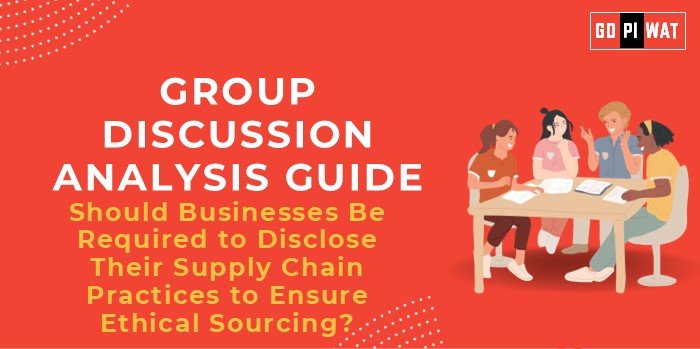📋 Group Discussion Analysis Guide: Should Businesses Be Required to Disclose Their Supply Chain Practices to Ensure Ethical Sourcing?
🌐 Introduction to the Topic
Opening Context: In a world increasingly driven by conscious consumerism, ethical supply chains have become a central issue. Disclosing supply chain practices ensures transparency, ethical labor practices, and environmental responsibility.
Topic Background: With global brands facing scrutiny over unethical labor, environmental degradation, and human rights violations, governments and stakeholders are calling for mandatory supply chain transparency.
📊 Quick Facts and Key Statistics
🌱 Environmental Impact: Supply chains account for 80% of greenhouse gas emissions in consumer goods industries.
🛍️ Consumer Behavior: 70% of millennials are willing to pay more for ethically sourced products (Nielsen Report).
🏛️ Regulations: EU Corporate Sustainability Reporting Directive (CSRD) mandates sustainability disclosures for businesses.
📈 Investor Sentiment: 88% of investors believe companies should disclose environmental, social, and governance (ESG) practices.
🤝 Stakeholders and Their Roles
- 🏢 Businesses: Responsible for ensuring ethical sourcing and maintaining transparent reporting.
- 🏛️ Governments: Enact regulations requiring supply chain disclosures (e.g., EU, UK Modern Slavery Act).
- 🛒 Consumers: Drive demand for ethically sourced goods and influence corporate behavior.
- 📈 Investors: Prioritize sustainability in investment decisions.
- 🌍 NGOs: Monitor compliance and advocate for transparency.
🏆 Achievements and Challenges
✨ Achievements:
- ✔️ Ethical Branding: Brands like Patagonia and Unilever have built trust through transparent supply chain disclosures.
- 🌟 Improved Labor Practices: Enforced transparency reduces child labor and forced labor incidences.
- 🌱 Environmental Impact: Ethical sourcing helps reduce deforestation and carbon footprints (e.g., Starbucks sustainable coffee sourcing).
- 📚 Consumer Awareness: Companies adopting ESG frameworks see increased loyalty from eco-conscious customers.
⚠️ Challenges:
- 💰 Cost Burden: Small businesses may face financial strain while implementing transparent systems.
- 🌍 Global Variability: Developing nations lack the infrastructure to enforce disclosure norms.
- ⚖️ Greenwashing Risks: Companies may falsely advertise ethical practices to maintain brand image.
🌎 Global Comparisons:
- 🇪🇺 EU Regulations: EU CSRD requires large businesses to disclose their environmental and human rights impacts.
- 🇺🇸 California Transparency Act: Mandates supply chain disclosures to prevent forced labor.
📚 Case Study:
- 🛍️ H&M’s Sustainable Supply Chain: By disclosing factory lists and adopting ethical certifications, H&M improved its reputation and consumer trust.
🗣️ Structured Arguments for Discussion
Supporting Stance: “Mandatory supply chain disclosures foster trust, prevent human rights violations, and ensure environmental sustainability, essential for long-term business success.”
Opposing Stance: “Implementing mandatory disclosures is costly and impractical for small businesses, leading to competitive disadvantages.”
Balanced Perspective: “While mandatory disclosures ensure ethical practices, a phased and incentivized approach can balance compliance with economic feasibility.”
💡 Effective Discussion Approaches
- 📜 Opening Approaches:
- Statistic-Based: “80% of global supply chain emissions make transparency crucial for environmental accountability.”
- Question-Based: “Should consumers have the right to know where their products come from?”
- 🛠️ Counter-Argument Handling:
- Challenge cost concerns with examples of businesses benefiting from ethical branding.
- Highlight phased implementation strategies to balance feasibility.
📈 Strategic Analysis of Strengths and Weaknesses
- 🏅 Strengths: Builds consumer trust, reduces exploitation, attracts investors.
- ⚠️ Weaknesses: High compliance costs, greenwashing risks.
- 💡 Opportunities: Enhances brand value, drives innovation in ethical sourcing.
- ⚡ Threats: Global inconsistency in regulations, lack of infrastructure.
🎓 Connecting with B-School Applications
- 📚 Real-World Applications: ESG-focused business strategies, risk management, and CSR projects.
- 💬 Sample Interview Questions:
- “How can ethical supply chains drive competitive advantage?”
- “Discuss the challenges businesses face in ensuring ethical sourcing globally.”
- 🔑 Insights for Students:
- Focus on integrating sustainability into operations.
- Explore frameworks like ESG and Triple Bottom Line.


